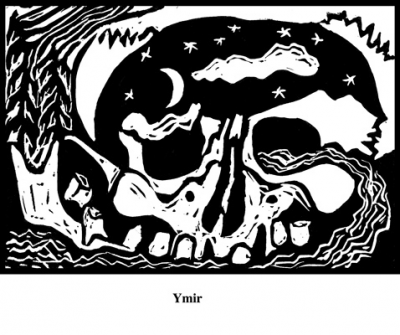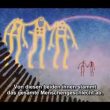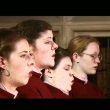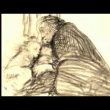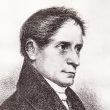| 28 November 2020 |
|
Every afternoon, as they were coming from school, the children used to go and play in the Giant’s garden.
It was a large lovely garden, with soft green grass. Here and there over the grass stood beautiful flowers like stars, and there were twelve peach-trees that in the spring-time broke out into delicate blossoms of pink andpearl, and in the autumn bore rich fruit. The birds sat on the trees and sang so sweetly that the children used tostop their games in order to listen to them. “How happy we are here!” they cried to each other.
One day the Giant came back. He had been to visit his friend the Cornish ogre, and had stayed with him forseven years. After the seven years were over he had said all that he had to say, for his conversation was limited,and he determined to return to his own castle. When he arrived he saw the children playing in the garden.
“What are you doing here?” he cried in a very gruff voice, and the children ran away.
“My own garden is my own garden,” said the Giant; “any one can understand that, and I will allow nobody toplay in it but myself.” So he built a high wall all round it, and put up a notice-board.
WILL BE
PROSECUTED
He was a very selfish Giant.
The poor children had now nowhere to play. They tried to play on the road, but the road was very dusty andfull of hard stones, and they did not like it. They used to wander round the high wall when their lessons wereover, and talk about the beautiful garden inside. “How happy we were there,” they said to each other.
Then the Spring came, and all over the country there were little blossoms and little birds. Only in the gardenof the Selfish Giant it was still winter. The birds did not care to sing in it as there were no children, and the treesforgot to blossom. Once a beautiful flower put its head out from the grass, but when it saw the notice-board itwas so sorry for the children that it slipped back into the ground again, and went off to sleep. The only peoplewho were pleased were the Snow and the Frost. “Spring has forgotten this garden,” they cried, “so we will livehere all the year round.” The Snow covered up the grass with her great white cloak, and the Frost painted all thetrees silver. Then they invited the North Wind to stay with them, and he came. He was wrapped in furs, and heroared all day about the garden, and blew the chimney-pots down. “This is a delightful spot,” he said, “we mustask the Hail on a visit.” So the Hail came. Every day for three hours he rattled on the roof of the castle till hebroke most of the slates, and then he ran round and round the garden as fast as he could go. He was dressed ingrey, and his breath was like ice.
“I cannot understand why the Spring is so late in coming,” said the Selfish Giant, as he sat at the window andlooked out at his cold white garden; “I hope there will be a change in the weather.
”But the Spring never came, nor the Summer. The Autumn gave golden fruit to every garden, but to theGiant’s garden she gave none. “He is too selfish,” she said. So it was always Winter there, and the North Wind,and the Hail, and the Frost, and the Snow danced about through the trees.
One morning the Giant was lying awake in bed when he heard some lovely music. It sounded so sweet to hisears that he thought it must be the King’s musicians passing by. It was really only a little linnet singing outside hiswindow, but it was so long since he had heard a bird sing in his garden that it seemed to him to be the mostbeautiful music in the world. Then the Hail stopped dancing over his head, and the North Wind ceased roaring,and a delicious perfume came to him through the open casement. “I believe the Spring has come at last,” said the Giant; and he jumped out of bed and looked out.
What did he see?
He saw a most wonderful sight. Through a little hole in the wall the children had crept in, and they weresitting in the branches of the trees. In every tree that he could see there was a little child. And the trees were soglad to have the children back again that they had covered themselves with blossoms, and were waving their armsgently above the children’s heads. The birds were flying about and twittering with delight, and the flowers werelooking up through the green grass and laughing. It was a lovely scene, only in one corner it was still winter. Itwas the farthest corner of the garden, and in it was standing a little boy. He was so small that he could not reachup to the branches of the tree, and he was wandering all round it, crying bitterly. The poor tree was still quite covered with frost and snow, and the North Wind was blowing and roaring above it. “Climb up! little boy,” saidthe Tree, and it bent its branches down as low as it could; but the boy was too tiny.
And the Giant’s heart melted as he looked out. “How selfish I have been!” he said; “now I know why theSpring would not come here. I will put that poor little boy on the top of the tree, and then I will knock down thewall, and my garden shall be the children’s playground for ever and ever.” He was really very sorry for what hehad done.
So he crept downstairs and opened the front door quite softly, and went out into the garden. But when thechildren saw him they were so frightened that they all ran away, and the garden became winter again. Only thelittle boy did not run, for his eyes were so full of tears that he did not see the Giant coming. And the Giant stoleup behind him and took him gently in his hand, and put him up into the tree. And the tree broke at once intoblossom, and the birds came and sang on it, and the little boy stretched out his two arms and flung them roundthe Giant’s neck, and kissed him. And the other children, when they saw that the Giant was not wicked anylonger, came running back, and with them came the Spring. “It is your garden now, little children,” said theGiant, and he took a great axe and knocked down the wall. And when the people were going to market at twelveo’clock they found the Giant playing with the children in the most beautiful garden they had ever seen.
All day long they played, and in the evening they came to the Giant to bid him good-bye.
“But where is your little companion?” he said: “the boy I put into the tree.” The Giant loved him the bestbecause he had kissed him.
“We don’t know,” answered the children; “he has gone away.”
“You must tell him to be sure and come here to-morrow,” said the Giant. But the children said that they didnot know where he lived, and had never seen him before; and the Giant felt very sad.
Every afternoon, when school was over, the children came and played with the Giant. But the little boy whomthe Giant loved was never seen again. The Giant was very kind to all the children, yet he longed for his first littlefriend, and often spoke of him.
“How I would like to see him!” he used to say.
Years went over, and the Giant grew very old and feeble. He could not play about any more, so he sat in ahuge armchair, and watched the children at their games, and admired his garden.
“I have many beautiful flowers,” he said; “but the children are the most beautiful flowers of all.”
One winter morning he looked out of his window as he was dressing. He did not hate the Winter now, for heknew that it was merely the Spring asleep, and that the flowers were resting.
Suddenly he rubbed his eyes in wonder, and looked and looked. It certainly was a marvellous sight. In thefarthest corner of the garden was a tree quite covered with lovely white blossoms. Its branches were all golden,and silver fruit hung down from them, and underneath it stood the little boy he had loved.
Downstairs ran the Giant in great joy, and out into the garden. He hastened across the grass, and came near tothe child. And when he came quite close his face grew red with anger, and he said, “Who hath dared to woundthee?” For on the palms of the child’s hands were the prints of two nails, and the prints of two nails were on thelittle feet.
“Who hath dared to wound thee?” cried the Giant; “tell me, that I may take my big sword and slay him.”
“Nay!” answered the child; “but these are the wounds of Love.”“Who art thou?” said the Giant, and a strange awe fell on him, and he knelt before the little child.
And the child smiled on the Giant, and said to him, “You let me play once in your garden, to-day you shallcome with me to my garden, which is Paradise.”
And when the children ran in that afternoon, they found the Giant lying dead under the tree, all covered withwhite blossoms.
| 30 August 2017 |
|
Die ersten Götter, Odin, Vé und Vili, töteten Ymir und bauten aus seinen Körperteilen die Welt: aus seinem Fleisch wurde die Erde, aus dem Blut das Meer, aus seinen Knochen Felsen und Gebirge, aus seinem Haar die Bäume, aus seinen Augenbrauen Midgard, aus seinem Schädel der Himmel und aus seinem Gehirn die Wolken.
Der Riese Ymir – Quelle: Wikipedia
Der Leib dient als Gedächtnis (Speicher/Register) [2]„akkumuliertes Kapital”, als Verortung von visualisierten Ideen, als Ablageplatz (Zeiger/Pointer) wiederauffindbarer Inhalte.
Fußnoten
| 4 November 2012 |
|
Eventuelle Kommentare zum Video-Clip bitte direkt auf YouTube!
Die schlesischen Weiber (0:12)
Heinrich Heine (1797 – 1856)
Im düstern Auge keine Träne,
Sie sitzen am Webstuhl und fletschen die Zähne.
Deutschland, wir weben dein Leichentuch.
Wir weben hinein den dreifachen Fluch –
Wir weben, wir weben!
Ein Fluch dem Gotte, zu dem wir gebeten
In Winterskälte und Hungersnöten.
Wir haben vergebens gehofft und geharrt.
Er hat uns geäfft und gefoppt und genarrt –
Wir weben, wir weben!
Ein Fluch dem König, dem König der Reichen,
Den unser Elend nicht konnte erweichen,
Der den letzten Groschen von uns erpresst
Und uns wie Hunde erschießen lässt –
Wir weben, wir weben!
Ein Fluch dem falschen Vaterlande,
Wo nur gedeihen Schmach und Schande,
Wo jede Blume früh geknickt,
Wo Fäulnis und Moder den Wurm erquickt –
Wir weben, wir weben!
Das Schiffchen fliegt, der Webstuhl kracht,
Wir weben emsig Tag und Nacht –
Altdeutschland, wir weben dein Leichentuch.
Wir weben hinein den dreifachen Fluch –
Wir weben und weben!
Deutschland. Ein Wintermärchen (2:14)
Heinrich Heine (1797 – 1856)
Caput I
Im traurigen Monat November wars,
Die Tage wurden trüber,
Der Wind riß von den Bäumen das Laub,
Da reist ich nach Deutschland hinüber.
Und als ich an die Grenze kam,
Da fühlt ich ein stärkeres Klopfen
In meiner Brust, ich glaube sogar
Die Augen begunnen zu tropfen.
Und als ich die deutsche Sprache vernahm,
Da ward mir gar seltsam zumute.
Ich meinte nicht anders, als ob das Herz
Recht angenehm verblute.
Ein kleines Harfenmädchen sang.
Sie sang mit wahrem Gefühle
Und falscher Stimme, doch ward ich sehr
Gerühret von ihrem Spiele.
Sie sang von Liebe und Liebesgram,
Aufopfrung und Wiederfinden
Dort oben, in jener besseren Welt,
Wo alle Leiden schwinden.
Sie sang vom irdischen Jammertal,
Von Freuden, die bald zerronnen,
Vom Jenseits, wo die Seele schwelgt
Verklärt in ewgen Wonnen.
Sie sang das alte Entsagungslied,
Das Eiapopeia vom Himmel,
Womit man einlullt, wenn es greint,
Das Volk, den großen Lümmel.
Ich kenne die Weise, ich kenne den Text.
Ich kenn auch die Herren Verfasser.
Ich weiß, sie tranken heimlich Wein
Und predigten öffentlich Wasser.
Ein neues Lied, ein besseres Lied,
O Freunde, will ich euch dichten!
Wir wollen hier auf Erden schon
Das Himmelreich errichten.
Wir wollen auf Erden glücklich sein,
Und wollen nicht mehr darben.
Verschlemmen soll nicht der faule Bauch,
Was fleißige Hände erwarben.
Es wächst hienieden Brot genug
Für alle Menschenkinder.
Auch Rosen und Myrten, Schönheit und Lust,
Und Zuckererbsen nicht minder.
Ja, Zuckererbsen für jedermann,
Sobald die Schoten platzen!
Den Himmel überlassen wir
Den Engeln und den Spatzen.
Und wachsen uns Flügel nach dem Tod,
So wollen wir euch besuchen
Dort oben, und wir, wir essen mit euch
Die seligsten Torten und Kuchen.
Ein neues Lied, ein besseres Lied!
Es klingt wie Flöten und Geigen!
Das Miserere ist vorbei,
Die Sterbeglocken schweigen.
Die Jungfer Europa ist verlobt
Mit dem schönen Geniusse
Der Freiheit, sie liegen einander im Arm,
Sie schwelgen im ersten Kusse.
Und fehlt der Pfaffensegen dabei,
Die Ehe wird gültig nicht minder –
Es lebe Bräutigam und Braut,
Und ihre zukünftigen Kinder!
Ein Hochzeitkarmen ist mein Lied,
Das bessere, das neue!
In meiner Seele gehen auf
Die Sterne der höchsten Weihe –
Begeisterte Sterne, sie lodern wild,
Zerfließen in Flammenbächen –
Ich fühle mich wunderbar erstarkt,
Ich könnte Eichen zerbrechen!
Seit ich auf deutsche Erde trat,
Durchströmen mich Zaubersäfte –
Der Riese hat wieder die Mutter berührt,
Und es wuchsen ihm neu die Kräfte.
Deutschland. Ein Wintermärchen (6:16)
Heinrich Heine (1797 – 1856)
Caput XX
Von Harburg fuhr ich in einer Stund
Nach Hamburg. Es war schon Abend.
Die Sterne am Himmel grüßten mich.
Die Luft war lind und labend.
Und als ich zu meiner Frau Mutter kam,
Erschrak sie fast vor Freude.
Sie rief: »Mein liebes Kind!« und schlug
Zusammen die Hände beide.
»Mein liebes Kind, wohl dreizehn Jahr
Verflossen unterdessen!
Du wirst gewiss sehr hungrig sein.
Sag an, was willst du essen?
Ich habe Fisch und Gänsefleisch
Und schöne Apfelsinen.«
»So gib mir Fisch und Gänsefleisch
Und schöne Apfelsinen.«
Und als ich aß mit großem Appetit,
Die Mutter ward glücklich und munter.
Sie frug wohl dies, sie frug wohl das,
Verfängliche Fragen mitunter.
»Mein liebes Kind! und wirst du auch
Recht sorgsam gepflegt in der Fremde?
Versteht deine Frau die Haushaltung,
Und flickt sie dir Strümpfe und Hemde?«
»Der Fisch ist gut, lieb Mütterlein,
Doch muss man ihn schweigend verzehren.
Man kriegt so leicht eine Grät in den Hals,
Du darfst mich jetzt nicht stören.«
Und als ich den braven Fisch verzehrt,
Die Gans ward aufgetragen.
Die Mutter frug wieder wohl dies, wohl das,
Mitunter verfängliche Fragen.
»Mein liebes Kind! in welchem Land
Lässt sich am besten leben?
Hier oder in Frankreich? Und welchem Volk
Wirst du den Vorzug geben?«
»Die deutsche Gans, lieb Mütterlein,
Ist gut. Jedoch die Franzosen,
Sie stopfen die Gänse besser als wir,
Auch haben sie bessere Saucen.« –
Und als die Gans sich wieder empfahl,
Da machten ihre Aufwartung
Die Apfelsinen. Sie schmeckten so süß,
Ganz über alle Erwartung.
Die Mutter aber fing wieder an
Zu fragen sehr vergnüglich
Nach tausend Dingen, mitunter sogar
nach Dingen, die sehr anzüglich.
»Mein liebes Kind! Wie denkst du jetzt?
Treibst du noch immer aus Neigung
Die Politik? Zu welcher Partei
Gehörst du mit Überzeugung?«
»Die Apfelsinen, lieb Mütterlein,
Sind gut, und mit wahrem Vergnügen
Verschlucke ich den süßen Saft,
Und lasse die Schalen liegen.«


